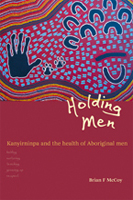Holding Men: Kanyirninpa and the health of Aboriginal men
Summary
This is an easily readable book that explores how Indigenous men understand their lives, their health and their culture.
Using conversations, stories and art, the author shows how Kimberley desert communities have a cultural value and relationship described as kanyirninpa or holding.
The author uses examples from Australian Rules football, petrol sniffing and imprisonment to reveal the possibilities for lasting improvements to men’s health based on kanyirninpa’s expression of deep and enduring cultural values and relationships.
While young Indigenous men’s lives remains vulnerable in a rapidly changing world, the author believes that an understanding of kanyirninpa (one of the key values that has sustained Aboriginal desert life for centuries) may provide the hope of change and better health for all. It also offers insights for all who wish to ‘grow up’ their young people.
Brian McCoy is an ordained Jesuit priest who has spent nearly four decades living and working in Indigenous communities in Australia and overseas. He has been priest, football coach, health researcher, ambulance officer, detention centre chaplain and adult educator and was a Research Officer in the Royal Commission into Aboriginal Deaths in Custody. Previously published Living and Working Cross-Culturally (1992), currently being republished, with Pat Dodson.
Reviews and endorsements
'With a sensitivity and compassion that is uncommon in Australian writings, McCoy shows how these shared experiences contain both positive and negative health outcomes for Aboriginal men. Above all, Holding Men is written as an urgent reminder to Western biomedicine that Aboriginal concepts of health and well-being remain intact despite decades of colonial interference.'
— Barry Judd, Pacific Affairs, March 2010
'Holding men call[s] for a complementary approach in which local models of sickness and health are recognised and used in unison with kartiya biomedical health care. In providing a basis for this appeal to be made, McCoy has entirely succeeded in this insightful and emotive book. This book will be relevant for anthropologists interested in Indigenous expressions of masculinity, the legacy of colonialism and localised negotiations over identity.'
— John White, The Asia Pacific Journal of Anthropology, September 2009
'Holding men is a thoughtful analysis and a work of great ethnographic sensitivity on
Western Desert men’s conceptions of health (and ill-health) and well-being, and, more broadly, on contemporary Australian Aboriginal manhood and values of masculinity…Written in a most accessible style, the book will be of interest to a wide range of readers: students in social sciences, health researchers and workers, anthropologists and psychologists.'
— Sylvie Poirier, Anthropological Forum, July 2009
'In a new book, Holding men: Kanyirninpa and the health of Aboriginal men, Fr McCoy argues that understanding the cultural values and relationships of indigenous men may provide the key to making lasting improvements to Indigenous men's health.
The book is the result of PhD research work from 2001 to 2004, and concentrates on the specific experiences of Kimberley desert men. Fr McCoy first went to work in this area in 1973, and so had 35 years to build relationships and understanding with the men involved.'
— Province Express, Jesuit newsletter, January 2009
'This is an important book, written in a lucid thoughtful way that leads us step by step through what is, for most of us, foreign land on Australian soil. In particular Holding men lets us feel the plight of Indigenous boys and young men, no longer being held by the land, by their elders, more and more autonomous and in physical and psychological peril, adrift from their traditions, lands and culture.'
— Chris Laming, Eureka, November 2008
'McCoy says the essence of Holding men was listening to people's stories. The book contains transcripts of some of the conversations. In one, he finally arrives at the reason for a 32-year-old man's indifference to returning to prison — he has no children.
The book also contains eight colour prints of paintings done in the traditional manner by people interviewed for the book. Four concern the role of the maparn — the traditional healer. Another, called Cross Roads, was painted by four young man and reveals the various paths available to them. One leads to the cemetery. In a statement accompanying the text, the artists say: ‘Some of the young men and women find themselves at the crossroads of their lives too early.’
In the end, says McCoy, "desert people strongly maintain their own health belief system...this is not to deny the importance of Western medical health care but to stress that it is inadequate to address the well-being of desert people by itself"'.
— Martin Flanagan, The Age, July 2008
Information about purchasing ASP’s ebooks.
